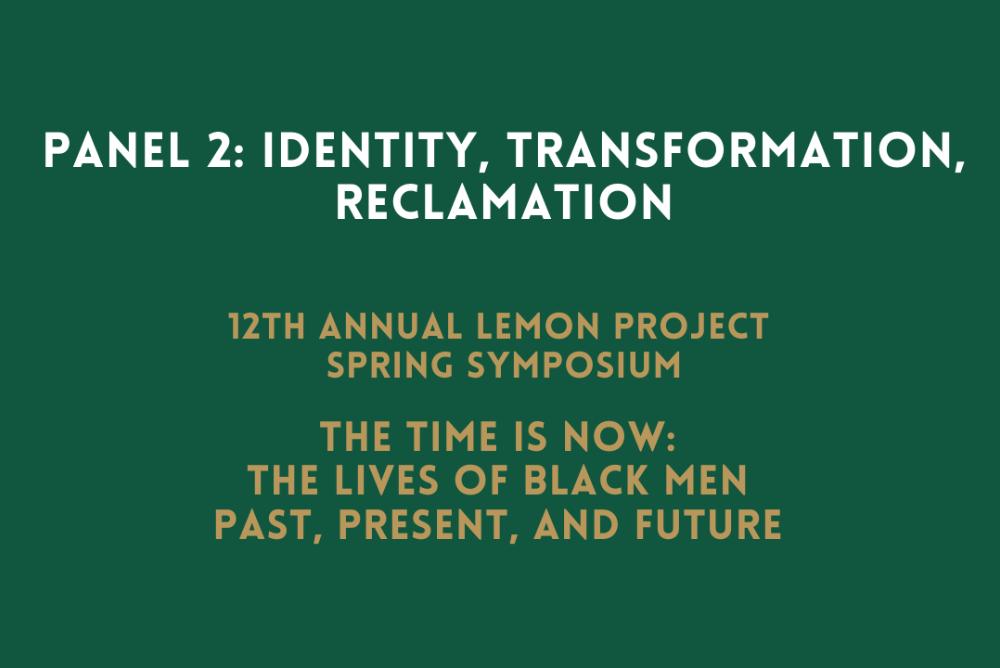W&M Featured Events
[PAST EVENT] 12th Annual Lemon Project Spring Symposium Panel 2: Identity, Transformation, Reclamation
Location
School of Education, In person at Dogwood Room and Virtual over Zoom301 Monticello Ave
Williamsburg, VA 23185Map this location
Access & Features
- Free food
- Open to the public
- Registration/RSVP

12th Annual Lemon Project Spring Symposium Panel 2: Identity, Transformation, Reclamation
To join us in person, register here.
To join us virtually, register here.
Benji de la Piedra, (he, him) Director of Herbert Denton Biography Project; Adjunct Professor of Oral History, University of District of Columbia; University of Arkansas at Little Rock, If Black Lives Matter, Then So Must Negro Memories
The dedication to Ralph Ellison’s novel Juneteenth reads, “To that Vanished Tribe Into Which I Was Born: The American Negroes.” This dedication induced an epiphany on my frame of reference as a student and scholar of African American experience. Not long before, I had made my first trip to Little Rock, Arkansas, conducting oral histories with Black elders about the childhood of Herbert Denton Jr, the Washington Post’s first Black city editor. This fieldwork allowed me to recognize the ironic overtones of Ellison’s dedication: while “Negro” had “vanished” from contemporary discourse, the cultural heritage and value-system encapsulated in that name had not. I had just spent the summer getting to know it. So I was not surprised several years later when I realized that Denton was the last Post reporter to continue using the word “Negro” in his copy. Like Ellison and also Albert Murray, Denton was not ashamed of identifying as a Negro. All three of these Afro-American intellectuals shared an anxiety about the potential death of living Negro memory, which deserves our attention. With their help, I will reflect on the longstanding Black American tradition of embodying “Negro” as an affirmative cultural identity, and the potential for cultural loss and historical amnesia that is implied in the term's wholesale rejection.
Eric S. King, (he/him) Community Member, The Archetypal Drama of Transformation in the Lives of Black Gay Men
This paper is a preliminary use of The Theory of the Archetypal Drama of Transformation, to interpret three novels by E. Lynn Harris: Invisible Life, Just as I am, and Abide with Me and to explore what these works teach us about a core drama of four ultimate or overarching ways of life that shape the structure, dynamics, values and stories within which some Black Gay/Queer men live their lives. First is emanation (living in a cultural container in which beliefs, values, norms and practices are considered sacred, endowed with mystery and therefore unquestionable). Second is incoherence (a way of life experienced as continually shattering and fragmented and offering no hope for solutions); there is also deformation (an exit from the core drama of life in which the completion for fragments --- and the attachment to a single fragment--- leads to destructive death), and transformation, a way of life in which one is free to question and act again in order to achieve fundamentally new and better relationships).
Dr. Kyle R. Fox, (He, Him) Faculty, The College of Coastal Georgia, Reaping the Harvest: Black Quare Embodiment in the Rural South
For centuries, enslaved African Americans were the labor force behind the economic engine that is U.S. Agribusiness. From the rice and indigo plantations of the Carolinas, to the tobacco plantations of Virginia, and the cotton and sugarcane plantations of the deep south, Black bodies toiled and labored under the grueling system of American chattel slavery. Post-emancipation and into the turn of the twentieth century, many Blacks continued to work the land, some as landowners, but most as tenant farmers and sharecroppers. During the early twentieth century, the growth rate of Black owned farms outpaced that of their white counterparts. In 1920, there were approximately 926,000 black farmers. This growth was not sustainable. Contemporarily, there are roughly 33,000 Black farmers accounting for 1.4% of the aging U.S. farmer population. Despite this statistic, there is a generation of young Black gay male farmers emerging. Whereas most research focuses on the decline of the Black farmer, this case study explores the experiences of this unexamined group. Employing Performance and Quare theory, this research fills a void in multiple disciplines in an effort to cultivate a more representative image of the contemporary Black farmer.
David Nnanna C. Ikpo, Lawyer, Storyteller, & Graduate Student, University of Pretoria, Decolonising queer legal advocacy through indigenous storytelling
In this presentation, I intend to share how I have employed indigenous storytelling as a Nigerian gay lawyer, novelist and researcher in my work on promoting queer inclusive international human rights law and advancing queer inclusive attitudes in family and across Nigerian universities. I will be addressing two particular instances of my debut novel Fimisile Forever (shortlisted for the LAMBDA prize for Best Gay Fiction) and my doctoral thesis titled, ‘A place for indigenous storytelling in Nigerian queer rights advocacy’. In 2014, Nigeria was a frightening place for queer persons because of the recently passed homophobic law, the Nigerian Same-Sex Marriage Prohibition Act (SSMPA) 2014. The SSMPA was iconic for me as a young gay man in Nigeria because it came with a multiplicity of stories. It was in the dawn of this excitement that I began to write my debut novel Fimisile Forever. I was angry, afraid, and deeply in need of a queer sensitive local hero that could give me answers, speak to my parents, my community on my behalf. My presentation will be guided by the theme of the lives of black gay men and also media representation of Black men.
Contact
[[setho2, Sarah Thomas]]
